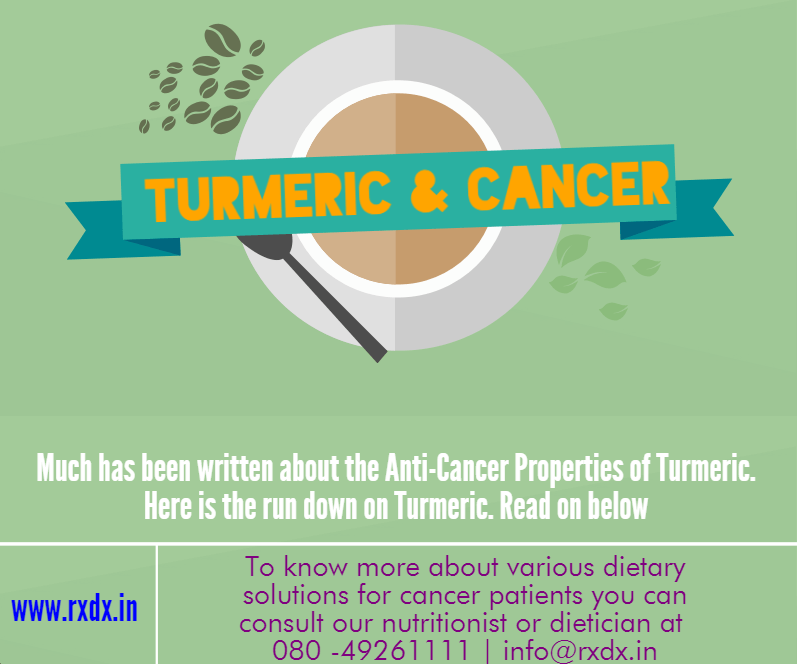
Can Turmeric Prevent Cancer ?
Turmeric is a spice that is often used as a food flavouring in Asian dishes. It belongs to the ginger family. It is also known as Indian saffron, jiang huang, haridra, haldi, as the major ingredient of curry powder 2, and as a bright yellow orange food colouring agent (E100).
Turmeric grows in many Asian countries such as India. It has been used for many years in some herbal remedies. The main active ingredient is curcumin or diferuloyl methane.
Currently there is no research evidence to show that turmeric or curcumin can prevent or treat cancer but early trials have shown some promising results.
A number of laboratory studies on cancer cells have shown that curcumin does have anticancer effects. It seems to be able to kill cancer cells and prevent more from growing. It has the best effects on breast cancer, bowel cancer, stomach cancer and skin cancer cells.
The anti-cancer action of curcumin (turmeric):
* Importantly, the spice can stop the action of the enzyme COX-2,known to increase chronic inflammation in the body. Such inflammation is a known precursor to cancer.
* It has also been shown to inhibit vascular epithelial growth factors. Every tumour needs a blood supply – the growth factors build one, but curcumin seems to stop them.
* It has been shown to ´re-awaken´ a key tumour suppressor gene.
* It has been shown to inhibit metastases.
* It has been shown to kill cancer cells (B lymphoma cells).
* It prevents regrowth of cancer stem cells which lie at the heart of many tumours.
* It has been shown to increase the effectiveness of certain drugs, while inhibiting their toxicity to healthy cells.
How to Enjoy
A Few Quick Serving Ideas
- Add turmeric to egg salad to give it an even bolder yellow color.
- Mix brown rice with raisins and cashews and season with turmeric, cumin and coriander.
- Although turmeric is generally a staple ingredient in curry powder, some people like to add a little extra of this spice when preparing curries. And turmeric doesn’t have to only be used in curries. This spice is delicious on healthy sautéed apples, and healthy steamed cauliflower and/or green beans and onions. Or, for a creamy, flavor-rich, low-calorie dip, try mixing some turmeric and dried onion with a little omega-3-rich mayonnaise, salt and pepper. Serve with raw cauliflower, celery, sweet pepper, jicama and broccoli florets.
- Turmeric is a great spice to complement recipes that feature lentils.
- Give salad dressings an orange-yellow hue by adding some turmeric powder to them.
- For an especially delicious way to add more turmeric to your healthy way of eating, cut cauliflower florets in half and healthy sauté with a generous spoonful of turmeric for 5 minutes. Remove from the heat and toss with olive oil, salt and pepper to taste.
Contraindications
- Patients with bile duct obstruction, gallstones, and GI disorders including stomach ulcers and hyperacidity disorders should not take this supplement.
- Laboratory findings indicate that dietary turmeric may inhibit the anti-tumor action of chemotherapeutic agents such as cyclophosphamide.
- Curcumin may also interact with drugs that are substrates of P-glycoprotein or cytochrome P450 enzymes.
- Patients with gastrointestinal disorders or predisposed to kidney stone formation should also use this supplement with caution.
- You are taking warfarin or other blood thinners. Turmeric may increase your risk of bleeding.
Dosage and supplementation
Depending on patients’ conditions, Curcumin Dosage range anywhere between taking one capsule a few times a week to taking about six capsules a single day provided the patients’ physicians are aware of their patients high Curcumin Dosage. Unlike other supplement pills, curcumin is just a regular gelatin capsule and is not enteric coated. To maximize its absorption, it is recommended that patients accompany curcumin with fatty foods or ideally used simultaneously with fish oil supplement. Cancer patients Curcumin Dosage is however different since they are advised to take as much as four 900mg capsules thrice a day for periods covering about 6 to 12 months, reducing Curcumin Dosage as time progresses.
Although turmeric is considered safe for most healthy adults, knowing the quantity of turmeric in milligrams used in the cure and treatment of particular conditions is of great importance and it is considered safer for patients to use over the counter Turmeric Supplements which are made using controlled and specific amounts of turmeric.



